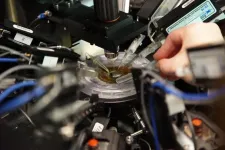(Press-News.org) A team of UC Davis Health researchers discovered that a common anti-inflammatory drug, mesalamine, can replace the work of good bacteria in fighting the nasty fungus Candida albicans in the gut.
C. albicans, or candida, is known to cause yeast infections. In some cases, it develops into invasive candidiasis, a potentially fatal infection occurring mostly in patients with compromised immunity.
The researchers found that this fungus can’t grow without an oxygen supply. Their study in mice showed that the drug can maintain a low oxygen (hypoxia) environment that prevents fungal bloom in the gut.
Their study appears today in Cell Host & Microbe
Antibiotic use may lead to fungal bloom in the gut
The team studied how C. albicans colonizes the gut. The fungus, best known for causing vaginal yeast infections, is usually treated with a topical or oral antifungal without serious side effects. It also harmlessly lives in the gut of around 60% of people.
Yet, when the body’s immunity goes down due to cancer or chemotherapy, the fungus may grow beyond the colon and spread throughout the body. In such cases, the patient develops invasive candidiasis.
“Invasive candidiasis is a potentially deadly infection with a mortality rate of around 50%. That’s even with the best available treatment,” explained the study’s lead author Andreas Bäumler. Bäumler is a distinguished professor in the Department of Medical Microbiology and Immunology.
Patients with leukemia and other blood cancers may need to take antibiotics. This use may cause an imbalance in the gut’s microbial community. It reduces Clostridia, a group of bacteria that promotes resistance to fungi colonization in the gut. With less Clostridia, C. albicans grows and colonizes in the tract.
“A bloom of C. albicans in the gut during antibiotic therapy is the most common cause of candidemia in people treated for blood cancers,” Bäumler explained. Candidemia is the presence of fungi or yeast in the blood.
Bäumler and his team wanted to understand the factors involved in antibiotic-induced colonization of C. albicans in the gut.
Candida loves simple sugars and oxygen
They first colonized germ-free mice with Candida to see what the fungus consumed to bloom. They realized that Candida really liked simple sugars, similar to those found in high-sugar diets. Then, they tested its growth in a petri dish. They placed Candida with simple sugars in an aerobic (with oxygen) setting, and the fungi bloomed.
“A healthy gut has low oxygen. So, we repeated the test in a hypoxia setting,” Bäumler said. The fungi didn’t grow despite the presence of sugars. This meant oxygen is a necessary condition for Candida growth.
The role of probiotics in preventing fungal growth
The team did a series of experiments that showed antibiotic use reduced Clostridia in the gut. Giving mice probiotics, such as Clostridia, prevented C. albicans from growing in the gut. Yet, probiotics can be killed by antibiotics and cancer therapy. For this reason, probiotics would not help patients with leukemia or other blood cancers.
“Probiotics are often not safe in patients at the highest risk for invasive candidiasis,” Bäumler said. “Finding a therapy that can function like probiotics but can endure the impact of cancer treatment and antibiotics was important.”
Anti-inflammatory drugs as faux-biotics
The team explored 5-aminosalicylic acid (5-ASA) as a safer way to control C. albicans in the gut. 5-ASA, also known as mesalamine, is an anti-inflammatory drug. It is used to treat inflammatory bowel diseases (IBD) like Crohn’s disease and ulcerative colitis.
The team tested 5-ASA in mice treated with antibiotics. They found that the drug could replace the work of probiotics by preventing oxygen in the colon and C. albicans from expanding in the gut.
“Limiting oxygen in the gut by replacing the function of good bacteria could be a strategy for reducing invasive candidiasis,” Bäumler said. “Our study opens a totally new treatment option for fatal fungal infections, especially for patients with cancer. After all, fungi cannot become resistant against hypoxia.”
The team proposed the term “faux-biotics” to refer to products, such as 5-ASA, that mimic the function of probiotics like Clostridia.
The first coauthors of the study are Hannah Savage, Derek Bays and Connor Tiffany. The other co-authors are Mariela Gonzalez, Eli Bejarano, Thaynara Carvalho, Zheng Luo, Hugo Masson, Henry Nguyen, Renato Santos, Krystle Reagan and George Thompson of UC Davis.
END
An anti-inflammatory curbs spread of fungi causing serious blood infections
Study finds a common drug that can be used to limit yeast blooming in the gut after antibiotics use
2024-06-04
ELSE PRESS RELEASES FROM THIS DATE:
Intracerebral hemorrhage stroke outcomes improve with early minimally invasive surgery evaluated in clinical trial
2024-06-04
INDIANAPOLIS – Patients with an intracerebral hemorrhage have better medical outcomes when surgeons perform an early minimally invasive removal of a hematoma compared to those receiving the standard of care, according to a study published in the New England Journal of Medicine.
Indiana University School of Medicine faculty clinicians Mitesh Shah, MD, Bradley Bohnstedt, MD, Regg Singh, MD and Jason Allen, MD, PhD are co-authors ...
UC San Diego Health first in region to provide novel therapy for melanoma
2024-06-04
UC San Diego Health is the first hospital system in the region to offer a new immunotherapy treatment for metastatic melanoma. The personalized cellular therapy derived from tumor infiltrating lymphocytes (TIL), is the first solid tumor therapy on the market approved by the U.S. Food and Drug Administration (FDA).
“This one-time cellular immunotherapy is a powerful and robust tool to treat patients with advanced melanoma resistant to other approved therapies and who have limited treatment options,” said Gregory Daniels, MD, PhD, professor of ...
Zapping the right brain cells: The path to improved stimulation
2024-06-04
By Jake Siegel
SEATTLE, WASH.—June 4, 2024—New research by scientists at the Allen Institute’s Brain and Consciousness group and Cedars-Sinai offers an unprecedented look at how neurons respond to ES. Far from being uniform, different types of neurons showed distinct patterns of ‘syncing up’ with electrical fields. These patterns varied depending on the rate at which the ES was delivered.
The findings, published today in Neuron, could help doctors fine tune where, when, and how ...
How an Indian government policy backfired: the unintended consequences of price regulation of prescription drugs
2024-06-04
Researchers from Indian Institute of Management Calcutta, University of Chicago, and Management Development Institute, Gurgaon published a new Journal of Marketing study that examines the unintended consequences of an Indian government healthcare policy.
The study, forthcoming in the Journal of Marketing, is titled “Do No Harm? Unintended Consequences of Pharmaceutical Price Regulation in India” and is authored by Saravana Jaikumar, Pradeep K. Chintagunta, and Arvind Sahay.
In countries without universal health insurance or developed health care systems, governments try to make drugs affordable and accessible. For instance, ...
Exercising during pregnancy normalizes eating behaviors in offspring from obese mice
2024-06-04
Maternal obesity impacts the eating behaviors of offspring via long-term overexpression of the microRNA miR-505-5p, according to a study publishing June 4th in the open-access journal PLOS Biology by Laura Dearden and Susan Ozanne from the MRC Metabolic Diseases Unit, Institute of Metabolic Science, University of Cambridge, UK, and colleagues.
Previous studies in both humans and animal models have shown that the offspring of obese mothers have a higher risk of obesity and type 2 diabetes. While this relationship is likely the result of a complex relationship between genetics and environment, emerging ...
Managing mental health should be about more than mind
2024-06-04
Clinicians often default to treating mental health conditions with a variety of medication. This approach, however, largely ignores the role of environment, lifestyle, and social factors. Mental Health professionals must work toward a more holistic management picture, Sidarta Ribeiro, Ana Paula Pimentel, Paulo Amarante and colleagues at the Federal University of Rio Grande do Norte, Federal University of Rio de Janeiro and FIOCRUZ in Brazil argue in the new open-access journal PLOS Mental Health on June 4.
More people than ever are being diagnosed with mental health conditions—particularly children and young adults. The World Health Organization estimates that mental health ...
Signaling between brain regions altered in teenage internet addiction
2024-06-04
Max Chang and Irene Lee of University College London review neuroimaging studies of the effects of internet addiction on adolescent brains. Published June 4 in PLOS Mental Health, the study indicates that internet addiction is associated with disrupted signaling in the regions of the brain that are involved in multiple neural networks. These networks play an important role in controlling our attention, in association with intellectual ability, working memory, physical coordination, and emotional processing—all of which ...
In “mental illness” and “mental health”: how language around psychiatric conditions shifts
2024-06-04
A new survey of nearly 340,000 texts spanning 79 years shows that generic terms in mental health have shifted away from words like “disease” and “disturbance” and toward “psychiatric” and “mental health,” with “mental illness” becoming the most-used term. Nick Haslam and Naomi Baes at the University of Melbourne in Australia present these findings in the new open-access journal PLOS Mental Health on June 4.
The authors state that while words such as “crazy” and “lunatic” ...
Methods to quit smoking effective regardless of mental health history
2024-06-04
Sarah Jackson and colleagues from University College London and King’s College London branches of the SPECTRUM Consortium conducted a survey to study how mental health relates to methods people use to quit smoking, also known as smoking cessation aids. While the number of adults who smoke cigarettes has declined globally, people with mental health conditions are more likely to smoke and to do so more heavily. Because of these differences in tobacco use, the researchers theorized that the effectiveness of smoking cessation aids may be altered in individuals with a mental health condition. However, in their ...
Lived experience should be centered in future mental health research, say people with mental health conditions and their families and carers in nationwide Australian survey
2024-06-04
Lived experience should be centered in future mental health research, say people with mental health conditions and their families and carers in nationwide Australian survey.
####
Article URL: https://journals.plos.org/mentalhealth/article?id=10.1371/journal.pmen.0000010
Article Title: Experience is central and connections matter: A Leximancer analysis of the research priorities of people with lived experience of mental health issues in Australia
Author Countries: Australia
Funding: The ALIVE National Centre for Mental Health Research Translation is supported by a grant from the National Health and Medical Research Council (GNT2002047) ...
LAST 30 PRESS RELEASES:
Fund for Science and Technology awards $15 million to Scripps Oceanography
New NIH grant advances Lupus protein research
New farm-scale biochar system could cut agricultural emissions by 75 percent while removing carbon from the atmosphere
From herbal waste to high performance clean water material: Turning traditional medicine residues into powerful biochar
New sulfur-iron biochar shows powerful ability to lock up arsenic and cadmium in contaminated soils
AI-driven chart review accurately identifies potential rare disease trial participants in new study
Paleontologist Stephen Chester and colleagues reveal new clues about early primate evolution
UF research finds a gentler way to treat aggressive gum disease
Strong alcohol policy could reduce cancer in Canada
Air pollution from wildfires linked to higher rate of stroke
Tiny flows, big insights: microfluidics system boosts super-resolution microscopy
Pennington Biomedical researcher publishes editorial in leading American Heart Association journal
New tool reveals the secrets of HIV-infected cells
HMH scientists calculate breathing-brain wave rhythms in deepest sleep
Electron microscopy shows ‘mouse bite’ defects in semiconductors
Ochsner Children's CEO joins Make-A-Wish Board
Research spotlight: Exploring the neural basis of visual imagination
Wildlife imaging shows that AI models aren’t as smart as we think
Prolonged drought linked to instability in key nitrogen-cycling microbes in Connecticut salt marsh
Self-cleaning fuel cells? Researchers reveal steam-powered fix for ‘sulfur poisoning’
Bacteria found in mouth and gut may help protect against severe peanut allergic reactions
Ultra-processed foods in preschool years associated with behavioural difficulties in childhood
A fanged frog long thought to be one species is revealing itself to be several
Weill Cornell Medicine selected for Prostate Cancer Foundation Challenge Award
Largest high-precision 3D facial database built in China, enabling more lifelike digital humans
SwRI upgrades facilities to expand subsurface safety valve testing to new application
Iron deficiency blocks the growth of young pancreatic cells
Selective forest thinning in the eastern Cascades supports both snowpack and wildfire resilience
A sea of light: HETDEX astronomers reveal hidden structures in the young universe
Some young gamers may be at higher risk of mental health problems, but family and school support can help
[Press-News.org] An anti-inflammatory curbs spread of fungi causing serious blood infectionsStudy finds a common drug that can be used to limit yeast blooming in the gut after antibiotics use





